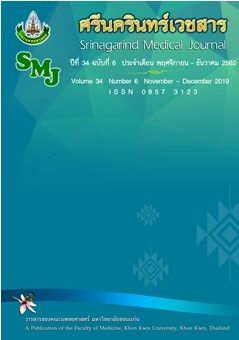The Impact of Self-Management Support by a Multidisciplinary Team on Delaying Chronic Kidney Disease Progression in Primary Care, Khon Kaen Regional Hospital
Keywords:
การจัดการตนเอง, ทีมสหสาขาวิชาชีพ, โรคไตเรื้อรัง Self-management support, Multidisciplinary team, Chronic kidney diseaseAbstract
ผลของการสนับสนุนการจัดการตนเองโดยทีมสหสาขาวิชาชีพเพื่อชะลอโรคไตเรื้อรังในหน่วยบริการปฐมภูมิ โรงพยาบาลศูนย์ขอนแก่น
ไพศาล ไตรสิริโชค1, หลั่งพร อุตรศาสตร์1, วราทิพย์ แก่นการ2
1โรงพยาบาลศูนย์ขอนแก่น
2 คณะพยาบาลศาสตร์ มหาวิทยาลัยราชภัฏอุบลราชธานี
หลักการและวัตุประสงค์: โรคไตเรื้อรัง เป็นปัญหาสุขภาพทั่วโลกที่มีความสัมพันธ์กับการเจ็บป่วยและการเสียชีวิตสูง การศึกษาครั้งนี้มีวัตถุประสงค์เพื่อศึกษาผลของการสนับสนุนการจัดการตนเองโดยทีมสหวิชาชีพเพื่อชะลอโรคไตเรื้อรัง
วิธีการศึกษา: การศึกษาครั้งนี้เป็นแบบกึ่งทดลอง กลุ่มเดียวทดสอบก่อนและหลังการทดลอง กลุ่มตัวอย่างเป็นผู้ป่วยโรคไตเรื้อรังระยะที่ 2-4 จำนวน 100 ราย ทำการคัดเลือกกลุ่มตัวอย่างโดยการสุ่ม ให้การสนับสนุนการจัดการตนเองโดยทีมสหสาขาวิชาชีพติดตามผล 12 เดือน โปรแกรมประกอบด้วย การแก้ไขปัญหาแลกเปลี่ยนประสบการณ์จากกรณีศึกษา การปรับเปลี่ยนพฤติกรรมได้แก่ ด้านการบริโภคอาหาร การใช้ยาสมเหตุผล และการออกกำลังกาย การติดตามเยี่ยมบ้านเพื่อเสริมพลังอำนาจรายบุคคล เครื่องมือที่ใช้เก็บรวบรวมข้อมูล ได้แก่ แบบสัมภาษณ์พฤติกรรมการจัดการตนเอง และการประเมินผลลัพธ์ทางคลินิก วิเคราะห์ข้อมูลโดยใช้สถิติเชิงพรรณนาและสถิติ Paired t-test
ผลการศึกษา: กลุ่มตัวอย่างมีอายุเฉลี่ย 69.71 ปี โรคร่วมเป็นโรคความดันโลหิตสูงและเบาหวานร้อยละ 44.21 ภายหลังการทดลองพบว่า กลุ่มตัวอย่างมีคะแนนเฉลี่ยพฤติกรรมการจัดการตนเอง และอัตราการกรองของไตเพิ่มขึ้นอย่างมีนัยสำคัญทางสถิติที่ระดับ p < .05 (57.39, 51.68 มล./นาที/1.73 ตร.ม.) นอกจากนี้มีระดับความดันโลหิตเฉลี่ยต่ำกว่าก่อนการทดลองอย่างมีนัยสำคัญทางสถิติระดับ p < .05 (127.92/71.02, 136.32/75.20 มม.ปรอท) อย่างไรก็ตามค่าดัชนีมวลกาย และเส้นรอบเอว พบว่า ก่อนและหลังการทดลองไม่แตกต่างกัน ( p >.05)
สรุป: การสนับสนุนการจัดการตนเองโดยทีมสหสาขาวิชาชีพทำให้พฤติกรรมการจัดการตนเอง และผลลัพธ์ทางคลินิกของผู้ป่วยโรคไตเรื้อรังดีขึ้น
Background and Objective: Chronic kidney disease (CKD), a global health problem issue, remains associated with high morbidity and mortality. This study aimed to study the effects of self-management support by multidisciplinary teams to delay chronic kidney disease.
Methods: This was a quasi-experimental research. One group was tested before and after the experiment. The study group were 100 CKD stages II–IV patients which randomized into self-management support by a multidisciplinary team and followed up for 12 months. The program consisted of problem solving, held experience-sharing sessions based on case studies, changing food consumption behavior, rational drug use, exercise, and home visits to encourage individual empowerment. The data-collecting instruments were self-management behavior interview and clinical outcomes. The data were analyzed using descriptive statistics and paired t-test.
Results: The mean age of participants was 69.71 years. The comorbidities were 44.21 % of diabetes mellitus with hypertension. After the program, the participants had an average score of self-management behavior and estimated glomerular filtration rate increased significantly at the level of p <.05 (57.39, 51.68 ml/min/1.73 m2). In addition, the average blood pressure level was lower than before the experiment with statistical significance at p <.05 (127.92 / 71.02, 136.32 / 75.20 mm Hg). However, BMI and waist circumference were not different (p>.05).
Conclusion: Self-management support by a multidisciplinary team helps improve clinical outcomes for CKD patients.
References
Hill NR, Fatoba ST, Oke JL, Hirst JA, O’Callaghan CA, Lasserson DS, et al. Global prevalence of chronic kidney disease—A systematic review and meta-analysis. PLoS ONE 2016;11:e0158765. doi: 10.1371/journal.pone.0158765.
De Nicola L, Zoccali C. Chronic kidney disease prevalence in the general population: heterogeneity and concerns. Nephrol Dial Transplant 2015; 31: 331–5.
Tanakidjaru P. Current situation of chronic kidney disease in Thailand. Journal of the Department of Medical Services 2015; 40: 5-18.
Ingsathit A, Thakkinstian A, Chaiprasert A, Sangthawan P, Gojaseni P, Kiattisunthorn K, et al. Prevalence and risk factors of chronic kidney disease in the Thai adult population: Thai SEEK study. Nephrol Dial Transplant 2010; 25: 1567–75.
Rumeyza K. Risk factors for chronic kidney disease: an update. Kidney Int Suppl (2011) 2013; 3: 368–371. Published online 2013 Nov 27. doi: 10.1038/kisup.2013.79.
Jiamjariyapon T, Ingsathit A, Pongpirul K, Vipattawat K, Kanchanakorn S, Saetie A, et al. Effectiveness of Integrated Care on Delaying Progression of stage 3-4 Chronic Kidney Disease in Rural Communities of Thailand (ESCORT study): a cluster randomized controlled trial. BMC Nephrol 2017; 18(1): 83. Published 2017 Mar 2. doi:10.1186/s12882-016-0414-4.
Chen YR, Yang Y, Wang SC, Chiu PF, Chou WY, Lin CY, et al. Effectiveness of multidisciplinary care for chronic kidney disease in Taiwan: a 3-year prospective cohort study. Nephrol Dial Transplant [Internet] 2013;28(3):671–682. doi: 10.1093/ndt/gfs469.
Chosivasakul K, Piaseu N, Sakdanupab S. Effects of a programme integrating multidisciplinary approach and self-management on chronic kidney disease patients with complications. Thai Journal of Nursing Council 2017; 32: 79-93.
Wagner EH, Austin BT, Davis C, Hindmarsh M, Schaefer J, Bonomi A. Improving chronic illness care: translating evidence into action. Health Aff (Millwood) 2001; 20: 64-78.
Lorig KR, Holman H. Self-management education: history, definition, outcomes, and mechanisms. Ann Behav Med 2003; 21: 1-7.
Zimbudzi E, Lo C, Misso ML, Ranasinha S, Kerr PG, Teede HJ, et al. Effectiveness of self-
management support interventions for people with comorbid diabetes and chronic kidney disease: a systematic review and meta-analysis. Syst Rev 2018; 7: 84. doi: 10.1186/s13643-018-0748-z.
Chen SH, Tsai YF, Sun CH, Wu IW, Lee CC, Wu MS. The impact of self-management support on the progression of chronic kidney disease-a prospective randomized controlled trial. Nephrol Dial Transplant 2011; 26: 3560-6.
Nancy H, Dominique T, Maya S, Anne Z. The impact of a multidisciplinary self-care management program on quality of life, self-care, adherence to anti-hypertensive therapy, glycemic control, and renal function in diabetic kidney disease: A Cross-over Study Protocol. BMC Nephrology 2016; 17: 88.
Suwanwaha S, Wonghongkul T, Panuthai S, Chaiard J. Effectiveness of self-management enhancement program for Thais with CKD at pre-dialysis stages: A randomized controlled trial. Pacific Rim Int J Nurs Res 2016; 20: 320-36.
Strand H, Parker D. Effects of multidisciplinary models of care for adult pre-dialysis patients with chronic kidney disease: a systematic review. Int J Evid Based Healthc 2012; 10: 53–9.
Cohen J. Statistical Power Analysis for Behavioral Sciences. New York: Academic Press. Stata Corp. 2003. STATA Reference Manual Release 10. Texas: Stata Press, 1977.
Jiamjariyaporn T, Ingsathit A, Tungsanga K, Banchuin C, Vipattawat K, Kanchanakorn S, et.al. Effectiveness of integrated care on delaying chronic kidney disease progression in rural communities of Thailand (ESCORT study): Rationale and Design of the Study. BMC Nephrology 2014; 15: 99.
Zhang QL, Rothenbacher D. Prevalence of chronic kidney disease in population-base studies systemic review. BMC Public heath 2008;8:1-8.
Ali B, & Gray-Vickrey P. Limiting the damage from acute kidney injury. Nursing 2011; 41(3): 22-31; quiz 32. doi: 10.1097/01. NURSE.0000394078.60229.0a.
Ghaderian SB, Beladi-Mousavi SS. The role of diabetes mellitus and hypertension in chronic kidney disease. J Renal Inj Prev 2014; 3: 109-10.
Sanee A. Self-management program in chronic diseases. Journal of The Royal Thai Army Nurses. 2014; 15: 129-34.
Thungtong S, Chinnawong T, Thaniwattananon P. Effects of Self-management support program for delayed progression of diabetic nephropathy on self-management behaviors and clinical outcomes in patients with uncontrolled type 2 diabetes mellitus. Songklanagarind Journal of Nursing 2015; 35: 67-84.


